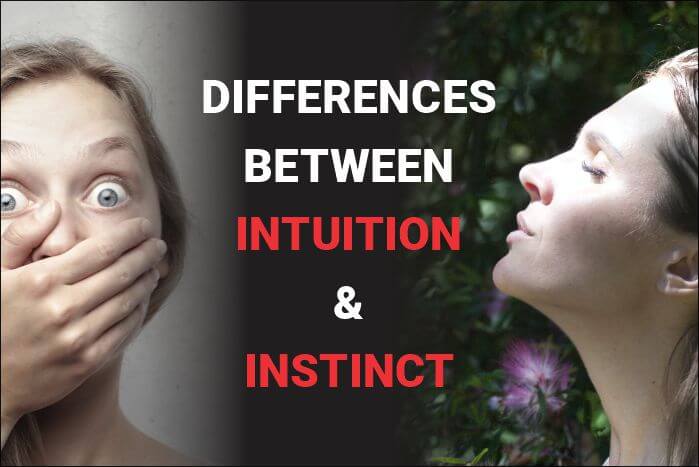Last updated on June 8th, 2025 at 01:30 pm
Understand the argument in intuition vs instinct and the difference in their unique roles in human decision-making and behaviour.
Intuition vs instincts is a timely topic for me because I have been passively thinking about the two words lately until I did extensive research and decided to come up with this post.
While instinct is an inborn fixed pattern in animals in response to incitement or stimuli, intuition is a word used in spirituality, philosophy, and psychology and in our everyday lives to describe the ability to understand and know things without consciously thinking about them.
Intuition is a thought that is way beyond the situation it points to and usually gives insight into the situation.
This means you don’t rely on evidence supported by the five senses to provide you with the information or answer to a situation, even though you can confirm the information with the five senses.
Origin of the Word “Intuition”

The origin of the word intuition is Latin ‘intueri’, which means to consider or contemplate.
However, this contemplation is within the mind and not done analytically with the rational mind.
This phenomenon, also called a hunch, can sometimes take you unawares with solutions and make you think there is something within you, like a guardian you are not aware of.
It is believed that intuition is an infinite knowledge that is elusive to humans and can be very helpful in decision-making when harnessed.
Instincts
Instinct, on the other hand, which is also referred to as fear, sometimes is a word that means to initiate or to set in motion, to urge. It is driven by a natural impulse that is fixed and does not need thinking.
Here is a dedicated article on instincts.
It is the primal driver of the entire animal’s genetically hardwired behaviours and guides humans, especially in dangerous situations to keep them safe quickly.
An automatic life-preserving technique for humans and animals that does not employ any immediate thinking.
It is a positive hijacking of the entire self by superior emotions, either to run or fight to preserve life.
For instance, we instinctively want revenge for a bad action against us by our perceived enemy. Or our instinctive fear of snakes.
In the absence of instinct, humans might not be able to defend themselves in the presence of danger or harsh environments.
Related Posts
- 14 Reliable Books On Intuition To Energize Your Life
- Why Emotional Intuition Matters: Making Better Decisions
- 12 Ways Your Life Depends on Primal Instincts
- Trusting your instincts in your relationships
- The Dark Side Of Intuition: Dangers Of Trusting Your Gut
- The Hidden Power Of Intuition
- 12 Tips On How To Tap Into Your Intuition
Intuition vs instinct: The main differences
Here is a video that tells the difference between instinct, which is also sometimes known as fear, and intuition by Marie Forleo.
Intuition vs instinct might seem to be an unnecessary comparison of two words with the same meaning, but as seen above, they have different meanings, though interchangeable.
Intuition and instinct are two distinct ways humans employ unconsciously to help them make decisions.
Whereas instinct is a fixed urge, drive, or encouragement, intuition is contemplation and more like a suggestion.
Here are the key differences:
1. Instinct is usually automatic, whereas intuition is thought-oriented
Instinct in dangerous situations is a rush of adrenaline that quickly enhances motor skills to be overly active to fight or flee to save lives.
On the other hand, intuition has more time to contemplate or examine the issues to make a decision, even though it’s not the making of the individual that the intuition arrives in the mind.
2. Intuition is not fixed, unlike instinct
Intuition is flexible and manifests in different situations to make decisions, while instinct is fixed and for specific purposes, which is to preserve life or protection.
For instance, intuition is used in determining a solution to a problem through troubleshooting.
It can serve as a guide in relationships to know when your partner is cheating or when others are scheming against you.
Your intuition drops messages and clues here and there for you to take action.
Also, intuition can be discarded, changed, or implemented depending on the needs of the individual. But instinct is a form of emotional hijack that makes the individual take a specific action.
3. Instinct is congenital, whereas intuition makes use of experiences and learning
What this means is that instinct is inbuilt and pretty much the same across humans and does not require the application of experience.
Every human species has instincts that manifest in the same way. We all have fear, envy, frustration, hatred, and other instinctive behaviours.
For instance, maternal instincts make it possible for a mother to have an unusually protective tendency over her newborn, which is based on a strong bond.
Intuition manifests based on an individual’s past experience and learning.
From our interaction with our environment, people, and every element around us, we learn, gain experience, make mistakes, learn from mistakes, and recognize patterns that would be reference points for intuition to hold on to.
4. Instinct is always accurate, while intuition is sometimes vague
Because instinct has to do with the five senses and is triggered physically because of what is felt or seen, it is accurate with immediate action.
Intuition on the other hand, is somewhat vague in some cases and requires deep thought to put the dots together. Some are clear, though.
Intuition is always used with intellectual ability and reasoning to make decisions and not rely on thought.
5. Intuition delivers on consciousness while instinct delivers on subconsciousness
Before intuition is successful, the individual must know about it and give it some thought.
But instinct is a necessity occasioned by a need to stay alive. So whether you give it a thought or not, you must respond to it, attend to it or you have problems.
6. Intuition is different from person to person, while instinct is the same within a species
Intuition, though, is possessed by every human; not all are aware of it or even care. Or simply put, people use it ignorantly as it is imbued in their daily lives but not obvious.
But instinct is quite the same and more distinct and recognizable in everybody.
For instance, we all run away from any wild animal because we don’t want to be mauled by it. The instinct to run is hardwired in human DNA and we can’t modify it.
What a person from Africa would do when he sees danger is what an American would do in the same situation.
What intuition means to people is different on an individual basis, but instinct stays constant across the board.
7. Intuition is unique, while instinct is repetitive
Intuition is almost always unique according to the situation it manifests while the response to instinct is predictable and what is expected.
Intuition is brought about by how much thought we put into a problem or situation, which stimulates the subconscious to throw up a solution or suggestion.
Most times, we can’t explain or describe the message intuition is trying to pass across, but 70% of the time, its suggestion is usually useful.
Are both intuition and instincts reliable?

Intuition and instinct are helpful systems from nature and serve different purposes.
Some factors however, make them either active or suppressed. Whereas some people have honed their intuition to be close to accurate, others are not even aware of theirs, nor do they know when it passes a message.
For instance, a person who is plagued with a problem that needs a solution, and has given it serious thought, might have a dream of the solution and act on it.
The solution in the dream might not be 100% clear, but there would surely be cues and clues to give a route to solving the problem.
On the part of instinct, it is most reliable for something clear enough to make someone take instinctive action.
Reliable in the sense that it is the subconscious trying to save the individual from harm by triggering the rush of adrenaline to stiffen the muscles and shut down pain receptors in case the individual is injured in the process.
Both are important in the life of humans, but intuition is reliable to people who know its importance, while instinct is reliable across the board.
Frequently Asked Questions
How is instinct different from intuition?
Instinct is an innate, fixed pattern of behavior in response to certain stimuli, while intuition is a gut feeling or hunch.
Can intuition be developed?
Yes, intuition can be honed through mindfulness, self-reflection, and paying attention to subtle cues and patterns in one’s experiences.
Are intuition and instinct always reliable?
While they can be valuable, they are not infallible. They can be influenced by biases, emotions, and past experiences.
Conclusion
I know this post must have laid to rest the arguments on intuition vs instincts which many consider to have the same meaning.
Though the meanings are close, they mean different things. Their commonality is that they both help humans to solve problems and remain alive.
They both can also be improved or sharpened by being deliberate about it and practicing.
Thank you for reading. If you are pleased with this post, you can let us know or suggest something to improve our content.
References:
- https://exploringyourmind.com/intuition-and-instinct-different-equally-powerful/
- https://oneofmany.co.uk/blog/instinct-or-intuition-can-you-tell-the-difference/
Pious Clements is the insightful voice behind "The Conducts of Life" blog, where he writes about life ethics, self-development, life mastery, and the dynamics of people and society.
With a profound understanding of human behaviuor and societal dynamics, Pious offers thought-provoking perspectives on ethical living and personal growth.
Through engaging narratives and astute observations, he inspires readers to navigate life's complexities with wisdom and integrity, encouraging a deeper understanding of the human experience and our place within society.

